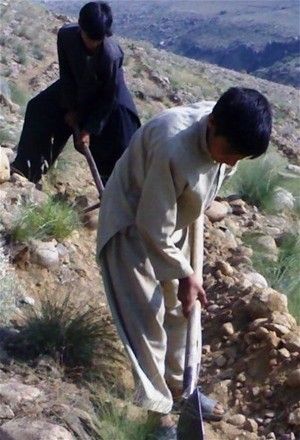
Eighteen-year-old Abdul Khaliq helps terrace a hillside in Nurguram, Nuristan Province.
Ajmal Nuristani
USAID’s AWATT project is mitigating seasonal floods one terrace at a time
5 NOVEMBER 2010 | NURISTAN, AFGHANISTAN
From craggy slopes of the Hindu Kush, Nuristan feeds snowpack and monsoon runoff into eastern Afghanistan’s river network, often with devastating consequences. Unchecked, these seasonal torrents wash out nearby settlements and flood riverside communities hundreds of kilometers downstream, some as far away as Pakistan. To compound the problem, Nuristan’s once-abundant forests, a natural defense against erosion and flooding, have been decimated by logging, drought, and clearing for farmland.
Regenerating Nuristan’s natural resource base and managing its watersheds are urgent priorities, and success will benefit the provincial economy and improve the safety of vulnerable lowlands. USAID’s Afghanistan Water, Agriculture, and Technology Transfer (AWATT) project is currently helping residents of Nuristan restore degraded watersheds and reduce flooding.
Recently, recurring flood damage in Nurguram District motivated government and community leaders to ask AWATT to help rehabilitate land along the Alingar River. The resulting five-month project is transforming 150 hectares into a water demonstration area and introducing better land management practices to area farmers. AWATT engineers are also teaching local officials and workers proper erosion and flood mitigation techniques and how to restore watersheds.
Employing 300 to 400 local workers daily for five months, the project is converting worn and rutted hillside into functional land that is able to withstand annual downpours, by building spaced rows of terraces and dams and planting tree saplings. Terracing slows the runoff of heavy rains, allowing soil more time to absorb the overflow and the trees strengthen the slopes with root systems that soak up additional water.
Abdul Khaliq, an 18-year-old student from the nearby village of Nangaresh, cited several reasons for participating in the project. “I am working here to earn money and learn about agriculture,” he explained. “This project will make this area green, help our community, and create grazing for our animals.”
AWATT has also improved watersheds in the provinces of Balkh, Herat, Kabul, Kapisa, Kunar, Laghman, Nangarhar, Paktya, Paktika, and Parwan.







Comment
Make a general inquiry or suggest an improvement.